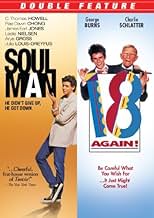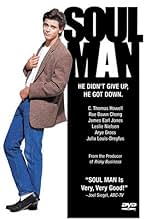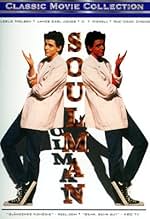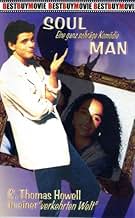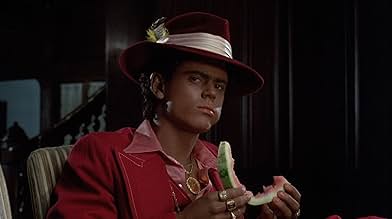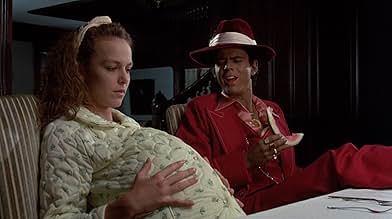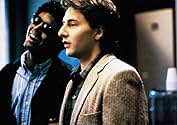IMDb RATING
5.3/10
9.6K
YOUR RATING
To achieve his dream of attending Harvard, a pampered teen poses as a young black man to receive a full scholarship.To achieve his dream of attending Harvard, a pampered teen poses as a young black man to receive a full scholarship.To achieve his dream of attending Harvard, a pampered teen poses as a young black man to receive a full scholarship.
James Sikking
- Bill Watson
- (as James B. Sikking)
Maree Cheatham
- Mrs. Dorothy Watson
- (as Marie Cheatham)
Wallace Langham
- Barky Brewer
- (as Wally Ward)
David Reynolds
- Ernie
- (as Dave Reynolds)
- Director
- Writer
- All cast & crew
- Production, box office & more at IMDbPro
Featured reviews
As much as this movie floundered at times I still liked it. There were points I was thinking, "This is absurd," yet they pulled it off. What started off to be something of a daft comedy full of despicable racial stereotypes was all just a set up for a grand ending.
Mark Watson (C. Thomas Howell) is a rich white L.A. kid living a shallow life, but he does get accepted to Harvard Law, which is no small task. It's at this time that his father (James B. Sikking) takes the advice of a less than stable psychiatrist and cut his son off financially.
Mr. Watson: "Son I want to give you your manhood."
Mark: "What would that mean in practical terms?"
Mr. Watson: "Well, it means I want you to go to Harvard, I want you to work hard-- very very hard. I also want you to feel good about yourself. You wanna feel good about yourself don't you son?"
Mark: "Sure Dad."
Mr. Watson: "Ha ha ha. That's why I've decided to let you pay your own way."
Mark: (stunned beyond belief) "Dad. That's... that's a sweet gesture, but it's really not necessary."
Mr. Watson: "Oh I think it is."
Mark: "What are you saying dad?"
Mr. Watson: "I'm saying that I took the money in your tuition account and used it to buy timeshare in a condo in Barbados."
And there you have it. Confident, excited Mark was turned into desperate Mark. In his desperation he hatched a hair-brained scheme. He would make himself up to look Black in order to get the Henry Q. Bouchard scholarship which is reserved for qualified Black applicants. What could go wrong? As Mark put it,
"It's gonna be great! These are the 80's man, it's the Cosby decade. America loves Black people."
Oh, how wrong he was.
For me, this movie was the cinematic representation of the book "Black Like Me." In 1959 John Howard Griffin took some pills to darken his skin in order to experience what it was like to be Black. He wrote an incredible book about the experience. Soul Man is a more humorous version of that same experiment.
Mark slowly learned that everyone didn't love Black people and that this plot of his would be much tougher than he imagined. And that was the most pleasing part of the movie. Seeing a privileged white kid come around to understand--even if only an inkling--what it's like to be Black.
Mark Watson (C. Thomas Howell) is a rich white L.A. kid living a shallow life, but he does get accepted to Harvard Law, which is no small task. It's at this time that his father (James B. Sikking) takes the advice of a less than stable psychiatrist and cut his son off financially.
Mr. Watson: "Son I want to give you your manhood."
Mark: "What would that mean in practical terms?"
Mr. Watson: "Well, it means I want you to go to Harvard, I want you to work hard-- very very hard. I also want you to feel good about yourself. You wanna feel good about yourself don't you son?"
Mark: "Sure Dad."
Mr. Watson: "Ha ha ha. That's why I've decided to let you pay your own way."
Mark: (stunned beyond belief) "Dad. That's... that's a sweet gesture, but it's really not necessary."
Mr. Watson: "Oh I think it is."
Mark: "What are you saying dad?"
Mr. Watson: "I'm saying that I took the money in your tuition account and used it to buy timeshare in a condo in Barbados."
And there you have it. Confident, excited Mark was turned into desperate Mark. In his desperation he hatched a hair-brained scheme. He would make himself up to look Black in order to get the Henry Q. Bouchard scholarship which is reserved for qualified Black applicants. What could go wrong? As Mark put it,
"It's gonna be great! These are the 80's man, it's the Cosby decade. America loves Black people."
Oh, how wrong he was.
For me, this movie was the cinematic representation of the book "Black Like Me." In 1959 John Howard Griffin took some pills to darken his skin in order to experience what it was like to be Black. He wrote an incredible book about the experience. Soul Man is a more humorous version of that same experiment.
Mark slowly learned that everyone didn't love Black people and that this plot of his would be much tougher than he imagined. And that was the most pleasing part of the movie. Seeing a privileged white kid come around to understand--even if only an inkling--what it's like to be Black.
Pills that can tan your entire body?! Huh. ;)
C.Thomas Howell is so good in his role. His charm is so intoxicating and you always wanna laugh at him. He looks like a cuter version of steve-o from jackass, with discolored skin and a black curly 'fro! He looks so obviously NOT black.
The best part of this film is the editing style. I recently discovered the importance of editing; it's good that this one was edited at a very quick and entertaining pace, otherwise it would've seemed outdated by today.
I actually think a film like this would make it today, since there's a heavy backlash from the '90's 'political correctness' theme. There are some heavy themes here, (although it's a comedy) but C.Thomas Howell keeps you wanting more. Supporting roles from James Earl Jones, the character Sarah, and her son are all great, but C.Thomas Howell keeps this film timeless; he is perfect.
C.Thomas Howell is so good in his role. His charm is so intoxicating and you always wanna laugh at him. He looks like a cuter version of steve-o from jackass, with discolored skin and a black curly 'fro! He looks so obviously NOT black.
The best part of this film is the editing style. I recently discovered the importance of editing; it's good that this one was edited at a very quick and entertaining pace, otherwise it would've seemed outdated by today.
I actually think a film like this would make it today, since there's a heavy backlash from the '90's 'political correctness' theme. There are some heavy themes here, (although it's a comedy) but C.Thomas Howell keeps you wanting more. Supporting roles from James Earl Jones, the character Sarah, and her son are all great, but C.Thomas Howell keeps this film timeless; he is perfect.
I remember watching this in my early teens, and thinking it was one of the funniest films that I had seen. Watching it again over 10 years later, its still pretty funny. In the age of political correctness it probably has quite poor taste, but thats not its intention. Its a lightweight comedy, and thats the way it should be taken. There are a few moments where a message and moral does come through, especially in the later half of the film. This adds to the films charm, as well as giving people a fairly superficial albeit correct notion of the social struggle faced by some races. C Thomas Howell was very good in this film, and I feel that its a shame that he does not make that many feature films these days- he seems to appear a lot in direct to video films. It was also interesting to watch Julia Louis-Dreyfuss in her very pre-Seinfeld days, before she became Elaine. This really is a funny film, very unbelievable but heaps better than the lame comedies that the big studios are serving up these days.
You can't talk about a movie like "Soul Man" without feeling your feet inevitably hitting a soap box. So let's get the film's controversy out of the way: Is it wrong for a white person like Mark Watson (C. Thomas Howell) to disguise himself as a black person? In most cases, yes. Is it wrong to do so to obtain a scholarship? In all cases, double yes. Does it make a bad idea for a movie? Not necessarily.
The problem with "Soul Man" is not so much its premise as much as its execution. You have a white college student, Mark, from L.A. who learns that he and his friend Gordon (Arye Gross) have been accepted into Harvard Law School. The only problem is that even though he comes from a well-to-do family, his father decides not to support him financially. Mark tries every way to pay for his tuition and living expenses, including applying for financial aid, for which he is immediately turned down. I'm not so sure if that would happen in real life, but then again, I haven't applied to law school. Plus, anyone can apply for student loans, right? Regardless, Mark eventually comes across Harvard's only viable full-ride scholarship he can find, which happens to be solely for African-American students. In a fraudulent and risky move, he decides to turn himself black. He does so by taking tanning pills that increase the melanin in his skin, and dons a Jheri curl.
There are two problems with this transformation: 1.) Howell does not look African-American at all when he darkens his skin. In fact, I thought he looked like an Indian-American with a really bad hair stylist. Yet, in this movie, no character seems to think for a second that this guy isn't black, not even Harvard Professor Banks (James Earl Jones), who seems way too educated to be fooled.
2.) Most importantly, you never actually see Mark Watson come to the conclusion that posing as a black man is a good idea. The film just suddenly jump cuts from his vain attempts to seek financial support to his racial transformation, all with no explanation whatsoever. I wanted to see him take those pills and at least get an idea of what was going through his head. Also, why did he decide on a Jheri curl as a haircut? I would imagine that a Jheri curl, which already requires an ozone-killing amount of hair spray as it is, would be more difficult to maintain than simply shaving his head. John Howard Griffin employed the latter hairstyle choice while doing research for the novel "Black Like Me".
I could go on about the character weaknesses of Mark Watson, such as the fact that he doesn't seem smart enough to mop the floors of Harvard Law School let alone be a student there, nor does he have the motivation. He made the dumb decision to attend Professor Banks' criminal law class simply because Professor Banks was "a brother". He doesn't seem to register how intimidating James Earl Jones is as a Harvard professor, whereas I got the impression immediately as Jones was taking attendance in his first scene.
It's not C. Thomas Howell's fault that the Mark Watson character is the way he is, although his career suffered because of it. It's just that Mark should have been developed more, and not just be made a carbon copy of a member of the Delta Tau Chi frat in "Animal House" (1978). If Arye Gross's character was made that way, that's fine, but making both characters inept really ruins the base of the story.
Otherwise, I actually liked the parts of the film where Mark begins to realize that racism is not something that just died after the 1960's. He does say at one point that, "This (the 1980's) is the Cosby decade! America loves black people!" Well, not so much. While racism is not as obvious as it was before the Civil Rights Movement, it's still alive and well even in liberal Massachusetts.
I liked how Howell gets fazed little by little over two white classmates who like telling racists jokes to one another. I also thought his time in jail with unruly white disgruntled baseball players was stinging enough. The basketball montage (featuring Ronald Reagan's son, Ron Reagan) was also very funny.
I thought most of the supporting actors were convincing. Rae Dawn Chong was charming as ever, although her career also fizzled after this movie for some reason. Leslie Nielsen was also good as Mr. Dunbar, a building superintendent who does not take kindly to his beautiful daughter's (Melora Hardin) attraction to black Mark. The scene when he envisions Mark as a watermelon-eating pimp who shouts "Whatchu lookin' at!?!" was biting, but funny.
The fact that all these characters, black or white, were fooled by Mark being a black man is still what contributed to this movie's lack of credibility. Apparently also, not everyone was laughing at this movie either. Spike Lee and Eddie Murphy publicly denounced it. Then again, though, Richard Pryor reportedly found it funny.
Films about characters who make bad choices are not necessarily bad choices for movie plots. This wasn't a bad idea for a movie, but it could have been stronger if vital pieces of exhibition were not skimmed over haphazardly. What results is a film that is not black or white, but too gray.
The problem with "Soul Man" is not so much its premise as much as its execution. You have a white college student, Mark, from L.A. who learns that he and his friend Gordon (Arye Gross) have been accepted into Harvard Law School. The only problem is that even though he comes from a well-to-do family, his father decides not to support him financially. Mark tries every way to pay for his tuition and living expenses, including applying for financial aid, for which he is immediately turned down. I'm not so sure if that would happen in real life, but then again, I haven't applied to law school. Plus, anyone can apply for student loans, right? Regardless, Mark eventually comes across Harvard's only viable full-ride scholarship he can find, which happens to be solely for African-American students. In a fraudulent and risky move, he decides to turn himself black. He does so by taking tanning pills that increase the melanin in his skin, and dons a Jheri curl.
There are two problems with this transformation: 1.) Howell does not look African-American at all when he darkens his skin. In fact, I thought he looked like an Indian-American with a really bad hair stylist. Yet, in this movie, no character seems to think for a second that this guy isn't black, not even Harvard Professor Banks (James Earl Jones), who seems way too educated to be fooled.
2.) Most importantly, you never actually see Mark Watson come to the conclusion that posing as a black man is a good idea. The film just suddenly jump cuts from his vain attempts to seek financial support to his racial transformation, all with no explanation whatsoever. I wanted to see him take those pills and at least get an idea of what was going through his head. Also, why did he decide on a Jheri curl as a haircut? I would imagine that a Jheri curl, which already requires an ozone-killing amount of hair spray as it is, would be more difficult to maintain than simply shaving his head. John Howard Griffin employed the latter hairstyle choice while doing research for the novel "Black Like Me".
I could go on about the character weaknesses of Mark Watson, such as the fact that he doesn't seem smart enough to mop the floors of Harvard Law School let alone be a student there, nor does he have the motivation. He made the dumb decision to attend Professor Banks' criminal law class simply because Professor Banks was "a brother". He doesn't seem to register how intimidating James Earl Jones is as a Harvard professor, whereas I got the impression immediately as Jones was taking attendance in his first scene.
It's not C. Thomas Howell's fault that the Mark Watson character is the way he is, although his career suffered because of it. It's just that Mark should have been developed more, and not just be made a carbon copy of a member of the Delta Tau Chi frat in "Animal House" (1978). If Arye Gross's character was made that way, that's fine, but making both characters inept really ruins the base of the story.
Otherwise, I actually liked the parts of the film where Mark begins to realize that racism is not something that just died after the 1960's. He does say at one point that, "This (the 1980's) is the Cosby decade! America loves black people!" Well, not so much. While racism is not as obvious as it was before the Civil Rights Movement, it's still alive and well even in liberal Massachusetts.
I liked how Howell gets fazed little by little over two white classmates who like telling racists jokes to one another. I also thought his time in jail with unruly white disgruntled baseball players was stinging enough. The basketball montage (featuring Ronald Reagan's son, Ron Reagan) was also very funny.
I thought most of the supporting actors were convincing. Rae Dawn Chong was charming as ever, although her career also fizzled after this movie for some reason. Leslie Nielsen was also good as Mr. Dunbar, a building superintendent who does not take kindly to his beautiful daughter's (Melora Hardin) attraction to black Mark. The scene when he envisions Mark as a watermelon-eating pimp who shouts "Whatchu lookin' at!?!" was biting, but funny.
The fact that all these characters, black or white, were fooled by Mark being a black man is still what contributed to this movie's lack of credibility. Apparently also, not everyone was laughing at this movie either. Spike Lee and Eddie Murphy publicly denounced it. Then again, though, Richard Pryor reportedly found it funny.
Films about characters who make bad choices are not necessarily bad choices for movie plots. This wasn't a bad idea for a movie, but it could have been stronger if vital pieces of exhibition were not skimmed over haphazardly. What results is a film that is not black or white, but too gray.
When I started to watch this film I thought, not another teen movie. That's not to say it wasn't funny because it was hilarious but then something happened in the film as it began to give a message of racism in American society in particular(and the world by inference). The premise that a white student could become black just by using tanning pills is so ridiculous but if you get over that funny leap in belief and you give this film your time you will be rewarded with a sentimental love story with a anti-racist message and what's more, the movie makes you think- what if I were black? Would I be treated like that just on the basis of the colour(or color as you Americans spell it) of my skin?
The main character Howell comes across as a bit of a j***k, pardon my language, at first but you see him mature with what he sees happening around him. His self importance disappears with every racist moment and we are left with not a broken man as maybe someone who had to put up with it all through their life (a Black person) but because he can go back to being seen as important in society (i.e. a white man) he is left enriched by the experience and an infinitely better person. The love angle is very well portrayed especially by two people who actually went on to get married after the movie in real life which just shows the chemistry between them on screen. The only thing after seeing this movie that I can see wrong with it is its competing ideas and themes- you are not sure what you have watched, was it a teen movie, love story, drama or anti-racist 'propaganda'. Personally as someone who likes all those types of movies I think it is the my greatest modern movie of all time. 10/10
The main character Howell comes across as a bit of a j***k, pardon my language, at first but you see him mature with what he sees happening around him. His self importance disappears with every racist moment and we are left with not a broken man as maybe someone who had to put up with it all through their life (a Black person) but because he can go back to being seen as important in society (i.e. a white man) he is left enriched by the experience and an infinitely better person. The love angle is very well portrayed especially by two people who actually went on to get married after the movie in real life which just shows the chemistry between them on screen. The only thing after seeing this movie that I can see wrong with it is its competing ideas and themes- you are not sure what you have watched, was it a teen movie, love story, drama or anti-racist 'propaganda'. Personally as someone who likes all those types of movies I think it is the my greatest modern movie of all time. 10/10
Did you know
- TriviaC. Thomas Howell had to wear colored contacts when his skin was toned to look black. His eyes are normally a goldish color and really stood out once his skin was darkened.
- GoofsAbout fifteen minutes into the picture, Mark and Gordon are seen traveling up Mass. Ave. in Cambridge, adjacent to the Harvard campus, and suddenly, they're not on Mass. Ave. anymore, they're on Quincy St., a couple blocks away. Then, just as suddenly, they're right back on Mass Ave., again proceeding through Harvard Square, just as they were before.
- Quotes
Professor Banks: You've learned something I can't teach them. You've learned what it feels like to be black.
Mark: No sir.
Professor Banks: Beg your pardon?
Mark: I don't really know what it feels like sir. If I didn't like it, I could always get out. It's not the same sir.
Professor Banks: You've learned a great deal more than I thought.
- How long is Soul Man?Powered by Alexa
Details
Box office
- Gross US & Canada
- $27,820,000
- Opening weekend US & Canada
- $4,422,179
- Oct 26, 1986
- Gross worldwide
- $27,820,000
- Runtime1 hour 44 minutes
- Color
- Sound mix
- Aspect ratio
- 1.85 : 1
Contribute to this page
Suggest an edit or add missing content



